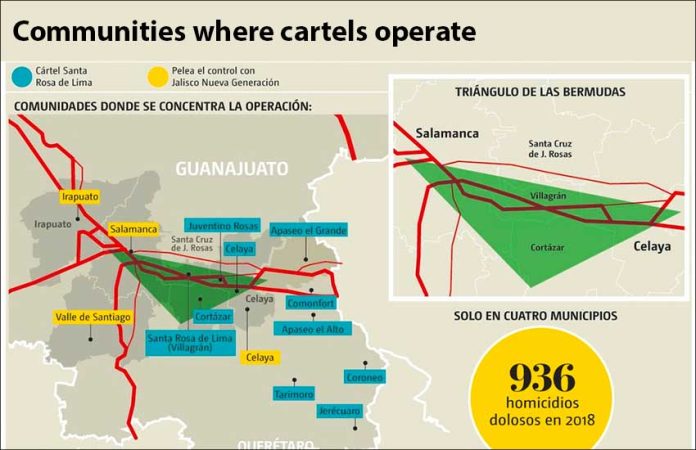The fuel theft gang believed to be behind much of the violence that made Guanajuato Mexico’s deadliest state last year is now expanding into Querétaro and Hidalgo, according to federal intelligence officials.
The Santa Rosa de Lima Cartel has expanded its area of influence significantly over the past two years and now has operational bases in the Guanajuato municipalities of Villagrán, Juventino Rosas, Celaya, Apaseo el Grande and Apaseo el Alto, the officials told the newspaper Milenio.
The gang’s suspected leader, José Antonio “El Marro” Yépez, also has complete control of the municipalities of Cortazar, Jerécuaro, Comonfort, Coroneo and Tarimoro.
Since 2017, the cartel has expanded the area of territory it controls – known as the Guanajuato Triangle – from 130 square kilometers to 400 square kilometers despite efforts by both federal and state authorities to combat its activities.
The two Apaseo municipalities border Querétaro, providing a springboard for the cartel to move into that state, while it has also begun making its first incursions into Hidalgo, located farther east.
The areas targeted by the gang all have one thing in common: Pemex petroleum pipelines run through them.
As the Santa Rosa de Lima Cartel expands its presence – all the while tapping the pipelines to extract fuel which it sells on the black market – violence in the parts of Guanajuato in which the gang operates has surged, especially in areas where it is involved in a turf war with the Jalisco New Generation Cartel (CJNG).
Irapuato, Salamanca and Celaya, all three disputed by the two criminal organizations, ranked first, third and fourth respectively for the number of homicides they recorded in 2018, and along with Valle de Santiago accounted for 36% of all murders in Guanajuato.
The four municipalities also led the state for slayings of police officers. Six traffic police were shot and killed in one particularly violent attack in Salamanca on June 1 last year and two months later, three officers were abducted and executed in the same municipality.
In Apaseo el Alto, a candidate for mayor was shot dead while campaigning in May last year while the municipality’s new transport director was murdered the same day he took office last October.
On January 25, the director of the 911 emergency response service in Irapuato was killed after he refused to continue leaking information to the Santa Rosa Cartel and six days later, a narco-banner allegedly signed by Yépez appeared in Salamanca warning President López Obrador to remove security forces from Guanajuato or innocent people will die.
Explosives, referred to in the narcomanta as a “little gift,” were also left inside a vehicle parked in front of the Salamanca oil refinery but were removed by the army before they detonated.
Guanajuato recorded 3,290 homicides in 2018, making it the most violent state in Mexico, and ranked third for illegal pipeline taps.
The federal government is cracking down on fuel theft with a strategy that includes deploying the military and Federal Police to guard petroleum pipelines and other infrastructure owned and operated by the state oil company.
But despite authorities having a lot of information about the criminal leader known as “El Marro,” efforts to capture him have so far been fruitless and the criminal organization he heads continues to consolidate its power.
Source: Milenio (sp)
